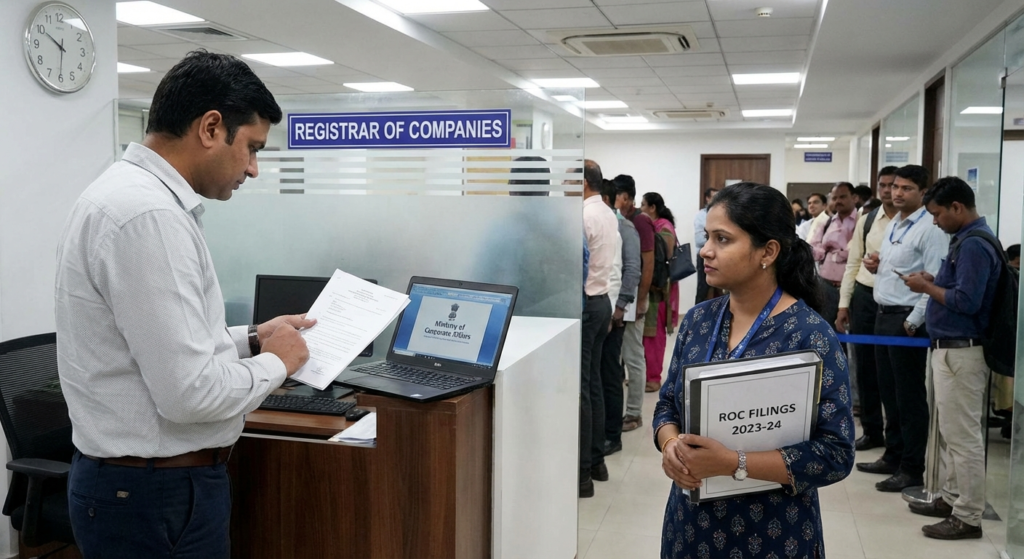Do you know what makes a Section 8 company special in India? These non-profit organizations focus on social welfare, charity, and education. They offer many benefits, making them popular among social entrepreneurs and NGOs. But, what does the process for Section 8 Company Registration Online look like? Let’s look at the steps to start your own Section 8 company in 2024.
What makes a Section 8 company unique? Discover the advantages that have drawn thousands of organizations to this special corporate structure in India.
Understanding Section 8 Company Registration Online
In India, a Section 8 company is a special kind of non-profit group. It’s registered under the Companies Act 2013. These groups aim to help with things like education, research, and social welfare. They can’t make profits for their members; all money goes back into their work. For those looking to establish such an organization, Section 8 Company Registration Online provides a streamlined way to get started with the registration process.
Definition of a Section 8 Company
A Section 8 company is a non-profit group with a special legal status. It’s different from NGOs and has its own benefits. The main thing is, it focuses on helping others, not making money for shareholders.
Objectives and Purpose of Section 8 Companies
- To promote commerce, art, science, sports, education, research, social welfare, religion, charity, or environmental protection.
- To operate as non-profit organizations that reinvest all income into their stated objectives.
- To provide limited liability protection for their members and directors.
- To leverage the legal and regulatory framework of the Companies Act 2013 to enhance their credibility and operations.
By opting for Section 8 Company Registration Online, organizations get tax breaks and legal benefits. This makes them a good choice for non-profits in India. It helps them work better and make a bigger difference.

| Attribute | Section 8 Company | NGO |
|---|---|---|
| Legal Structure | Registered under the Companies Act 2013 | Registered as a Trust or Society |
| Regulatory Framework | Governed by the Companies Act 2013 | Governed by the Societies Registration Act or Indian Trusts Act |
| Tax Exemptions | Eligible for tax exemptions under Sections 12A and 80G of the Income Tax Act | Eligible for tax exemptions under Sections 12A and 80G of the Income Tax Act |
| Credibility and Recognition | Enjoys legal recognition and credibility as a corporate entity | May face challenges in establishing credibility compared to a registered company |
| Profit Distribution | Prohibited from distributing profits to members | No restrictions on profit distribution |
Knowing the difference between Section 8 companies and NGOs helps entrepreneurs and non-profits in India. They can choose the best legal structure for their goals.
Benefits of Section 8 Company Registration Online
Section 8 company registration online in India brings many benefits to non-profits and social enterprises. It offers tax exemptions, boosts credibility, and gives a unique legal identity. These companies focus on social welfare and helping lower-income groups, making them great for positive change.
Tax Exemptions and Benefits
One big plus of a Section 8 company is its tax exemption under Sections 12A and 80G of the Income Tax Act, 1961. This lets the company and its donors get tax breaks on their contributions. It also means no stamp duty, cutting down on costs.
Credibility and Trust
Being recognized by the government gives Section 8 companies credibility and trust. They are seen as open and accountable, attracting donors and supporters. Their legal identity also lets them act independently and defend themselves in court.
Separate Legal Entity
Being a separate legal entity is a key advantage of Section 8 companies. It protects the personal assets of its members and directors. This lets them focus on their mission without worrying about personal money. Plus, they can own property, make contracts, and work on their own, giving them the freedom to succeed. For those looking to establish this type of organization, Section 8 Company Registration Online offers a streamlined way to get started and enjoy these benefits.
In summary, Section 8 company registration online in India is a smart choice for NGOs and social enterprises. It helps them make a bigger impact and stay strong over time.
| Benefit | Description |
|---|---|
| Tax Exemptions | Tax exemptions under Sections 12A and 80G of the Income Tax Act, 1961, allowing the company and its contributors to claim tax deductions on contributions. |
| Stamp Duty Exemption | Section 8 companies are exempt from paying stamp duty, reducing their operational costs. |
| Credibility and Trust | Government recognition and licensing, providing a sense of credibility and trust from the public and potential donors. |
| Separate Legal Entity | Section 8 companies have a separate legal identity, protecting the personal assets of stakeholders and enabling independent operations. |

“The tax exemptions and credibility provided by a Section 8 company registration have been instrumental in our ability to attract funding and support for our social welfare initiatives.”
Eligibility Criteria for Section 8 Company Registration
To register a Section 8 company in India, an organization must meet certain criteria. The Ministry of Corporate Affairs (MCA) sets these rules. The main rule is that the company’s goals must be for social welfare, charity, education, or other non-profit aims. There are also other guidelines to follow:
- For a private limited Section 8 company, you need at least two directors. Public limited companies need seven promoters.
- There’s no minimum capital needed for a Section 8 company. But, at least one director must live in India.
- The company name must be unique. It can’t be the same as any other company name or trademark.
- The company’s activities and goals must help advance science, art, social welfare, sports, or help the underprivileged financially.
- Section 8 companies can’t give profits or dividends to directors or members. Any extra money must go back into the company to support its goals.
Meeting these criteria lets organizations register a Section 8 company in India. This offers tax benefits, more credibility, and the chance to operate as a legal entity. It’s important to know and follow these rules for a smooth registration process.
| Eligibility Criteria | Requirement |
|---|---|
| Minimum Directors | 2 for private limited, 7 for public limited |
| Minimum Capital | No minimum capital requirement |
| Resident Director | At least one director must be a resident of India |
| Company Name | Unique and not identical to existing names |
| Objectives | Promotion of science, art, social welfare, sports, or financial support to the underprivileged |
| Profit Distribution | No distribution of profits or dividends to directors or members |
By understanding and meeting these criteria, organizations in India can register a Section 8 company. This registration offers tax benefits and more credibility. It helps them achieve their non-profit goals.
Documents Required for Section 8 Company Registration Online
To register a Section 8 company in India, you need certain documents. These documents help meet the rules and show your organization is real.
Documents for Directors and Shareholders
- PAN (Permanent Account Number) card for each director and shareholder
- Aadhaar card or any other valid ID proof for directors and shareholders
- Address proof (such as a bank statement or utility bill) for directors and shareholders
- Passport-sized photographs of directors and shareholders
Documents for Registered Office
- Proof of ownership or a No-Objection Certificate (NOC) for the registered office premises
- Utility bill (electricity, water, or landline) for the registered office address
You also need to submit the Memorandum of Association (MOA), Articles of Association (AOA), and a declaration form.
The total fees for a Section 8 company registration is ₹9,499. This includes fees for a Digital Signature Certificate, Government fees (Stamp Duty), and Professional fees. The whole process usually takes 10-14 working days.
| Registration Fee Component | Amount |
|---|---|
| Digital Signature Certificate | ₹3,000 |
| Government Fees (Stamp Duty) | ₹2,500 |
| Professional Fees | ₹3,999 |
| Total Registration Fees | ₹9,499 |
Registering a Section 8 company online is easy if you have all the needed documents for section 8 company registration ready. By following the documentation rules, you can make the registration process smoother. This helps you start your non-profit organization well.
Step-by-Step Guide to Section 8 Company Registration Online
Registering a Section 8 Company in India is easy thanks to online filing. This type of company is for social welfare and offers tax breaks and more credibility. To start, you need to follow a few steps on the MCA portal.
Obtaining Digital Signature Certificate (DSC)
The first step is getting a Digital Signature Certificate (DSC) from a Certifying Authority (CA). This DSC is key for signing and submitting all online forms and documents needed for registration.
Applying for Director Identification Number (DIN)
Every director needs a valid Director Identification Number (DIN). You can apply for a DIN online by filling out the DIR-3 form on the MCA portal. This number is a must for all directors in India.
Reserving the Company Name
Before you can register, you must reserve a unique name for your company. The name should include words like “Foundation,” “Association,” or “Society.” You can check if the name is available and reserve it through the MCA portal.
Filing SPICe+ Form
The last step is filing the SPICe+ form on the MCA portal. This form covers everything from name reservation to company incorporation and DIN allotment. You’ll need to submit documents like the Memorandum of Association (MOA) and Articles of Association (AOA) with your filing.
After you submit, the MCA will give you a Certificate of Incorporation and a Corporate Identity Number (CIN). This marks the end of the how to register a section 8 company online process. With the right help and preparation, the MCA portal section 8 registration is smooth.
Common Challenges in Section 8 Company Registration Online
Starting a Section 8 company in India has its perks but also some hurdles. One big challenge is making sure the company’s goals match the Section 8 rules. This is key to avoid any issues later on.
Getting your documents right is another big step. You need to have a clear Memorandum of Association (MoA) and Articles of Association (AoA). Using the Ministry of Corporate Affairs (MCA) portal can be tricky, especially for first-timers.
Finding a name for your company can be tough. The name must follow certain rules and not be too similar to others. Also, you need to meet certain requirements like having enough directors and members.
Technical problems with the online system can slow things down. These issues might include server problems or errors. After you register, keeping up with annual reports and records can be another challenge.
Despite these obstacles, the advantages of a Section 8 company in India are significant. Benefits include tax breaks, credibility, and being a legal entity. With the right help and careful planning, you can successfully register your company.
“Registering a Section 8 company in India can be a transformative step for non-profit organizations, but it’s essential to navigate the process carefully to unlock the full benefits.”
Tips for a Smooth Section 8 Company Registration Online Process
Registering a Section 8 company online in India is easy if you follow the right steps. It’s important to make sure your company fits the rules of Section 8 of the Companies Act, 2013. This will help your registration go smoothly.
Ensure Eligibility and Objectives Align with Section 8
Before you start, check if your company meets the Section 8 criteria. Make sure your goals are non-profit and align with the Act’s provisions. Your Memorandum of Association (MoA) and Articles of Association (AoA) should show your non-profit aims.
Prepare All Required Documents in Advance
Get all needed documents ready before starting. You’ll need a Digital Signature Certificate (DSC), Director Identification Number (DIN), and draft MoA and AoA. Having these ready will make the online process smoother.
Seek Professional Assistance if Needed
Even with an easier online process, getting help from experts is wise. Chartered accountants or company secretaries can offer valuable advice. They ensure you follow the latest rules and help with any issues. You can take the benefits of Section 8 Company Registration services provided by My Digital Filing.
By following these tips, you can make the section 8 company registration online process easier. Stay updated with the Ministry of Corporate Affairs (MCA) and use reliable internet for the online portal.
“Non-profit objectives only” – Requirement for Section 8 Companies under the Companies Act, 2013.
| Benefit | Description |
|---|---|
| 100% expense exclusion | Benefit for Section 8 companies under section 12AA of the Income Tax Act. |
| No base capital requirement | A distinguishing factor for Section 8 entities compared to public limited companies. |
| No specific terms in the name | Requirement for company names under section 8 ngo registration. |
Post-Registration Compliance for Section 8 Companies
Starting a Section 8 company in India is just the beginning. After registration, these non-profits must follow many rules to keep their legal status and tax breaks. It’s important for Section 8 companies to meet these post-registration duties to keep running smoothly and avoid fines.
Annual Compliance Requirements
Section 8 companies have to meet their yearly duties. These include:
- Holding an Annual General Meeting (AGM) within 6 months of the financial year’s end.
- Filing annual returns (Form MGT-7) with the Registrar of Companies (ROC) within 60 days after the AGM.
- Submitting audited financial statements (Form AOC-4) to the ROC within 30 days after the AGM.
- Filing income tax returns (Form ITR-6) by September 30th.
- Appointing an auditor for a 5-year term to do the annual audit.
Maintaining Proper Records and Documentation
Section 8 companies also need to keep detailed records and documents. This shows they follow the rules and goals of their work. They must:
- Keep detailed minutes of all board meetings and shareholder decisions.
- Save financial records, like books of accounts, invoices, and supporting documents.
- Update and protect the company’s statutory registers, like the register of members, directors, and charges.
- Get timely approvals from the Ministry of Corporate Affairs (MCA) for any changes in the company’s structure or goals.
Keeping accurate records and following the law is key for Section 8 companies. It helps them keep their tax-exempt status and do their charitable work well.
Success Stories of Section 8 Companies in India
Many organizations in India have made a big difference thanks to Section 8 company registration. These section 8 company benefits help non-profits get funding and work on big projects. They also team up well with government and international groups.
Teach For India is a great example. It finds talented people to teach in schools that need them most. Being a Section 8 company, Teach For India gets tax breaks and is seen as trustworthy. It now works in 7 cities, helping over 32,000 students every year.
Saahas Zero Waste is another success story. It works on making waste management better. As a Section 8 company, Saahas gets money from abroad and works with local governments. It has helped over 50 communities, improving life for thousands.
- Goonj helps in disaster relief and community development. Its Section 8 status helps it get resources and volunteers for its work in rural India.
- Grow-Trees.com focuses on saving the environment. It uses the advantages of section 8 companies for NGOs to plant over 6 million trees across India.
These stories show how Section 8 companies in India are making a big difference. They use their special benefits to help their communities in lasting ways.
Future of Section 8 Company Registration Online
The future of section 8 company registration online in India looks bright. The Ministry of Corporate Affairs (MCA) plans to make it easier and more digital. They aim to add better interfaces and maybe even AI help for those applying for MCA registration for section 8 companies.
Expect more openness and the ability to track your application in real-time. The whole process will be smoother, letting you see where you are at each step. The government might also offer more benefits to start section 8 companies, especially in key areas.
Section 8 companies are becoming more popular. This is because of their tax perks and the chance to make a difference. So, expect the online registration to get even better for non-profits and social businesses looking to register a section 8 company online in the future.
- Enhanced digital interfaces and AI-assisted guidance for section 8 company registration
- Increased transparency and real-time tracking of application status
- Potential introduction of additional incentives to promote section 8 company formation
- Continued simplification and optimization of the online registration process
As non-profits and social enterprises grow in India, the section 8 company registration online will get better. It will help organizations focus more on their missions and goals.
“The future of section 8 company registration lies in a seamless digital experience that empowers non-profits and social enterprises to make a lasting impact.”
Conclusion
The section 8 company registration online in India is a clear path for non-profit groups. It helps them start with more credibility and many benefits. These include tax breaks and protection for members, boosting their social work and how they run things.
The online sign-up might seem complex, but it’s actually easy to follow. Knowing what you need and how to do it through the MCA portal helps a lot. This way, non-profits can use the benefits of section 8 company status well and feel sure about their place.
As the non-profit world grows, it’s key to keep up with the online registration process for section 8 company and its rules. By using Section 8 company registration, non-profits in India can grow, work better, and make lasting changes in their areas.
FAQ
Q: What is a Section 8 company?
Q: What are the benefits of registering a Section 8 company?
Q: What are the eligibility criteria for Section 8 company registration?
Q: What documents are required for Section 8 company registration online?
Q: What is the online registration process for a Section 8 company?
Q: What are the common challenges in Section 8 company registration online?
Q: What are the post-registration compliance requirements for Section 8 companies?
Please Rate this post
Click to rate











